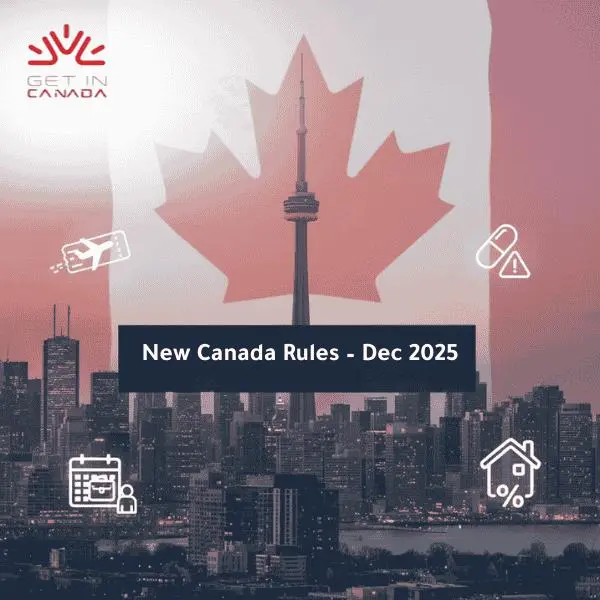New Canada PR Programs for Rural & French Communities
On January 30, 2025, the Canadian government introduced two new programs to help rural areas and French-speaking communities outside Quebec. These programs—the Rural Community Immigration Pilot (RCIP) and the Francophone Community Immigration Pilot (FCIP)—aim to bring more skilled workers to smaller towns and help these communities grow.
Many rural areas in Canada struggle to find enough workers, and French-speaking communities outside Quebec are seeing their populations shrink. These new programs will give people a direct way to become permanent residents in Canada while helping these communities stay strong.

Why are these two programs important?
Most people who move to Canada live in big cities like Toronto, Vancouver, or Montreal because of job opportunities and larger communities. This means small towns and rural areas struggle to attract workers and keep their populations growing. Many businesses in these areas need more employees but can’t find enough people to hire.
The French-speaking towns outside Quebec are also losing people as younger generations move away. The Francophone Community Immigration Pilot (FCIP) is designed to bring more French-speaking newcomers to these areas to keep their culture and economy strong.
The RCIP and FCIP will help solve these problems by making it easier for workers to settle in these areas with a clear path to permanent residency.
Find out if you are eligible to get in Canada →
Rural Community Immigration Pilot (RCIP)
Let’s discuss more about RCIP:
What is the RCIP?
The Rural Community Immigration Pilot (RCIP) is meant to help small communities by bringing in skilled workers who can fill job openings and help local businesses grow.
This program is based on the Rural and Northern Immigration Pilot (RNIP), which has already helped many small towns attract workers. The RCIP will include 14 communities across Canada.
Who can apply for the RCIP?
To be eligible for the RCIP, you must:
- Show you have enough money to support yourself and your family when moving to Canada.
- Have a job offer from a company in one of the participating communities.
- Have at least one year of work experience (1,560 hours) in the last three years in a field related to your job.
- Meet language requirements, depending on your job type:
- High-skill jobs (TEER 0 or 1): CLB 6
- Mid-skill jobs (TEER 2 or 3): CLB 5
- Lower-skill jobs (TEER 4 or 5): CLB 4
- Have a Canadian educational credential or a foreign equivalent (must be evaluated by an approved organization if studied outside Canada).
Where can you apply for the RCIP?
The 14 selected communities for the RCIP include:
- British Columbia: Peace Liard, West Kootenay, North Okanagan Shuswap
- Nova Scotia: Pictou County
- Ontario: North Bay, Sudbury, Timmins, Sault Ste. Marie, Thunder Bay
- Manitoba: Steinbach, Altona/Rhineland, Brandon
- Saskatchewan: Moose Jaw
- Alberta: Claresholm
Francophone Community Immigration Pilot (FCIP)
In the following, we’ll discuss more about FCIP:
What is the FCIP?
The Francophone Community Immigration Pilot (FCIP) is designed to help French-speaking towns outside Quebec grow by bringing in French-speaking workers. This program helps keep Canada’s bilingual culture alive while also filling job shortages in these areas.
The FCIP allows six communities to choose French-speaking skilled workers for permanent residency.
Communities in the FCIP also receive additional resources to help new immigrants settle, find jobs, and connect with local culture.
Who can apply?
To qualify for the FCIP, you must:
- Speak French fluently (must pass a French language test).
- Have a job offer from a company in one of the participating communities.
- Meet work experience and education requirements (similar to the RCIP).
- Show proof of savings, if needed, to support your move.
Which Communities are Part of the FCIP?
The six communities selected for the FCIP are:
- British Columbia: Kelowna
- New Brunswick: Acadian Peninsula
- Ontario: Sudbury, Timmins, Superior East Region
- Manitoba: St. Pierre Jolys
Special Rules for Some Workers
There are some special rules for some workers which are:
- Healthcare Workers: If you are a registered nurse (NOC 31301), you can apply with a job offer as a nurse aide, caregiver, or home support worker.
- International Students: If you studied in one of the communities, you don’t need to meet the work experience requirement if you:
- Completed a two-year diploma or degree
- Studied full-time and lived in the community for most of your program.
Canada’s Plan for the Future
The Canadian government believes immigration should support all parts of the country, not just big cities.
Government Support
The Honourable Marc Miller, Minister of Immigration, Refugees and Citizenship, said:
“Rural and French-speaking communities are important to Canada. By bringing skilled workers to these areas, we help businesses grow and encourage people to live in smaller communities.”
He also confirmed that Canada will make the RNIP a permanent immigration program because it has been successful in keeping immigrants in rural areas.
The Honourable Gudie Hutchings, Minister of Rural Economic Development, added:
“When small communities succeed, Canada succeeds. These programs will help fill jobs, grow businesses, and make life better for everyone.”
Important Points to Remember
You have to keep the following in mind:
- New Permanent Residency Pathways: The RCIP and FCIP make it easier for skilled workers and French-speaking immigrants to move to rural areas.
- Supporting Small Communities: These programs contribute to attracting labourers to small towns, supporting businesses, and increasing the population.
- Stronger French-speaking communities: FCIP helps to keep the French culture alive outside of Quebec by developing larger groups of French-speaking immigrants within these communities.
- Government Commitment: Canada is concentrating more on rural immigration to ensure all communities benefit from new immigrants.
Workers are now looking into some exciting opportunities for permanent residency in Canada, namely the Rural Community Immigration Pilot and the Francophone Community Immigration Pilot.
These programs will help not only small communities grow but also give a better chance at success for the immigrants themselves, matching them with jobs and supportive communities. If you are looking to move to Canada, these programs could be the way to a brighter future!










